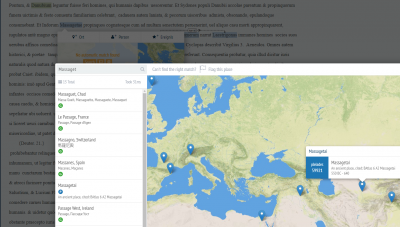Autor: José Luis Egío
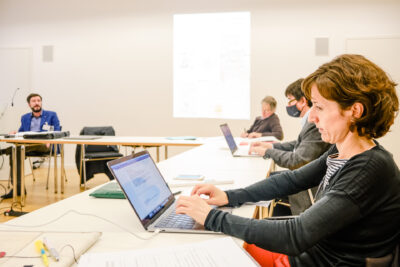
Entre el 25 y el 26 de octubre tuvo lugar en el Instituto Max Planck de Historia y Teoría del Derecho un importante Encuentro preparatorio del futuro Diccionario del Lenguaje Jurídico-Político de la Escuela de Salamanca. Estuvieron presentes destacadas figuras de la historia del derecho, la teología y la filosofía en la Primera Edad Moderna, venidos de Universidades italianas, españolas, francesas y danesas, en orden alfabético: Paolo Astorri (Copenhague), Juan Belda Plans (Pamplona), Manuela Bragagnolo (Trento), Luisa Brunori (Lille), Orazio Condorelli (Catania), Francisco Cuena Boy (Santander), Elena Danieli (Bologna), Lidia Lanza (Lisboa), María Martín (Salamanca), Faustino Martínez (Madrid), Joaquín Sedano (Pamplona), Idoya Zorroza (Salamanca), Pilar Mejía (Frankfurt), Ana Soler (Frankfurt).
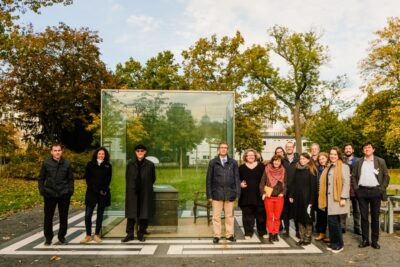
Durante el Encuentro, en el que se alternaron como lenguas co-oficiales el castellano y el italiano, tuvo lugar la presentación y debate de una serie de borradores de las primeras voces del Diccionario, a cargo de Danieli (maleficium), Belda Plans (theologia) y Cuena Boy (contractus & quasi contractus). Andreas Wagner y José Luis Egío, miembros del proyecto de investigación sobre la Escuela de Salamanca en el que se enmarca el Diccionario, presentaron, por su parte, la voz infidelitas. Ambos hicieron especial énfasis en la estructura y características formales que deberían tener los distintos artículos del Diccionario para lograr conformar, andando el tiempo, una obra homogénea. Las diferentes presentaciones estimularon, además, un amplio debate sobre formas idóneas para integrar las fuentes escolásticas en las distintas voces, el desafío que representa un amplio listado de conceptos cuyas implicaciones y campos de aparición son diversos en las obras de teólogos y juristas o las potencialidades a esperar de la versión electrónica de las voces del Diccionario, estrechamente interrelacionadas con el Corpus de fuentes de la Escuela de Salamanca que, actualmente, está siendo editado.
https://www.salamanca.school/es/works.html
El Encuentro sirvió asimismo para que Christiane Birr (coordinadora del proyecto La Escuela de Salamanca) y Thomas Duve (director del mismo) ofrecieran un balance del estado de desarrollo del mismo y discutieran con los y las participantes las estrategias de investigación a implementar en el futuro. Fruto de los debates celebrados se profundizó, por ejemplo, en la criba del listado de lemas a incluir en el Diccionario del Lenguaje de la Escuela de Salamanca, sugiriéndose estrategias para subsumir algunos lemas dentro de otros con un espectro de significación más amplio o la incorporación de términos relevantes provenientes del ámbito del derecho mercantil.
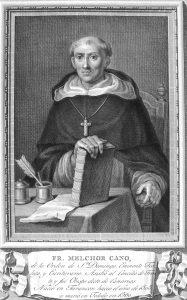
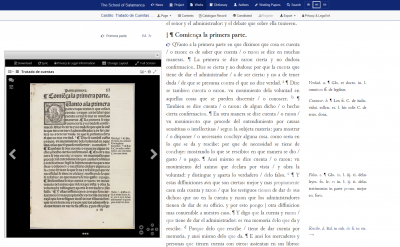 processing tools applicable to „low-resourced“ languages such as early modern Spanish or Latin, or of linguistic and semantic resources appropriate for these specific periods and languages. Finally, while discussions about (textual) data representations and visualizations lie at the very heart of current digital humanities endeavours, there still is only rudimentary consensus about best practices in representing early modern texts and data in all their (multimedial/multimodal) variety in digital forms, as well as about their versioning, forms of readerly participation, underlying software architectures, etc.
processing tools applicable to „low-resourced“ languages such as early modern Spanish or Latin, or of linguistic and semantic resources appropriate for these specific periods and languages. Finally, while discussions about (textual) data representations and visualizations lie at the very heart of current digital humanities endeavours, there still is only rudimentary consensus about best practices in representing early modern texts and data in all their (multimedial/multimodal) variety in digital forms, as well as about their versioning, forms of readerly participation, underlying software architectures, etc.